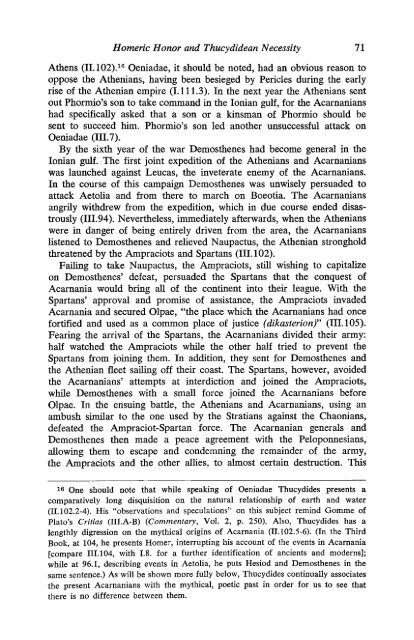philosophy - Interpretation
philosophy - Interpretation
philosophy - Interpretation
Create successful ePaper yourself
Turn your PDF publications into a flip-book with our unique Google optimized e-Paper software.
Homeric Honor and Thucydidean Necessity 71<br />
Athens (II.102).16 Oeniadae, it should be noted, had an obvious reason to<br />
oppose the Athenians, having been besieged by Pericles during the early<br />
rise of the Athenian empire (1.111.3). In the next year the Athenians sent<br />
out Phormio's son to take command in the Ionian gulf, for the Acarnanians<br />
had specifically<br />
asked that a son or a kinsman of Phormio should be<br />
sent to succeed him. Phormio's son led another unsuccessful attack on<br />
Oeniadae (III.7).<br />
By the sixth year of the war Demosthenes had become general in the<br />
Ionian gulf. The first joint expedition of the Athenians and Acarnanians<br />
was launched against Leucas, the inveterate enemy of the Acarnanians.<br />
In the course of this campaign Demosthenes was unwisely persuaded to<br />
attack Aetolia and from there to march on Boeotia. The Acarnanians<br />
angrily withdrew from the expedition,<br />
which in due course ended disas<br />
trously (111.94). Nevertheless, immediately afterwards, when the Athenians<br />
the Acarnanians<br />
were in danger of being entirely driven from the area,<br />
listened to Demosthenes and relieved Naupactus, the Athenian stronghold<br />
threatened by the Ampraciots and Spartans (III. 102).<br />
Failing to take Naupactus, the Ampraciots,<br />
still<br />
wishing<br />
to capitalize<br />
on Demosthenes' defeat, persuaded the Spartans that the conquest of<br />
Acarnania would bring<br />
Spartans'<br />
all of the continent into their league. With the<br />
approval and promise of assistance, the Ampraciots invaded<br />
Acarnania and secured Olpae, "the place which the Acarnanians had once<br />
fortified and used as a common place of justice (dikasterion)" (III. 105).<br />
Fearing the arrival of the Spartans, the Acarnanians divided their army:<br />
half watched the Ampraciots while the other half tried to prevent the<br />
Spartans from joining them. In addition, they<br />
sent for Demosthenes and<br />
the Athenian fleet sailing<br />
off their coast. The Spartans, however, avoided<br />
the Acarnanians' attempts at interdiction and joined the Ampraciots,<br />
while Demosthenes with a small force joined the Acarnanians before<br />
Olpae. In the ensuing battle, the Athenians and Acarnanians, using an<br />
ambush similar to the one used by the Stratians against the Chaonians,<br />
defeated the Ampraciot-Spartan force. The Acarnanian generals and<br />
Demosthenes then made a peace agreement with the Peloponnesians,<br />
allowing them to escape and condemning the remainder of the army,<br />
the Ampraciots and the other allies, to almost certain destruction. This<br />
i One should note that while speaking<br />
of Oeniadae Thucydides presents a<br />
comparatively long disquisition on the natural relationship<br />
(II. 102.2-4). His "observations and<br />
of earth and water<br />
speculations"<br />
on this subject remind Gomme of<br />
Plato's Critias (III.A-B) (Commentary, Vol. 2, p. 250). Also, Thucydides has a<br />
lengthly digression on the mythical origins of Acarnania (11.102.5-6). (In the Third<br />
Book, at 104, he presents Homer, interrupting his account of the events in Acarnania<br />
[compare ni.104, with 1.8. for a further identification of ancients and moderns];<br />
while at 96.1, describing events in Aetolia, he puts Hesiod and Demosthenes in the<br />
same sentence.) As will be shown more fully below, Thucydides continually associates<br />
the present Acarnanians with the mythical, poetic past in order for us to see that<br />
there is no difference between them.
















